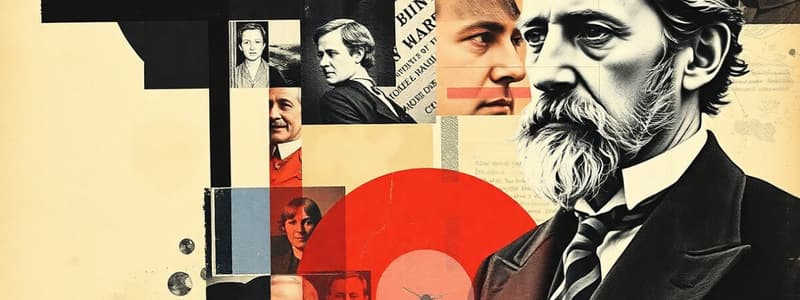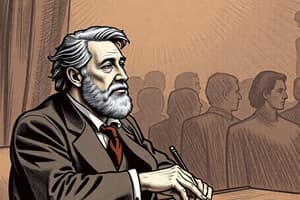Podcast
Questions and Answers
Match the political theorist with their key concept:
Match the political theorist with their key concept:
Burke = Gradual, evolutionary change Hobbes = Powerful state to prevent anarchy Oakeshott = Cautious governance due to human fallibility Rand = Capitalism as a moral system
Match the thinker with their view on society:
Match the thinker with their view on society:
Burke = Importance of local communities Nozick = Personal liberty and free market Hobbes = Need for sovereign authority Oakeshott = Stability through tradition
Match the idea with the correct theorist:
Match the idea with the correct theorist:
Leviathan = Hobbes Little Platoons = Burke Libertarian Conservatism = Nozick Pragmatism = Oakeshott
Match the ideology with the description:
Match the ideology with the description:
Match the political view with its implication:
Match the political view with its implication:
Match each theory with its fundamental principle:
Match each theory with its fundamental principle:
Match the thinker with their societal contribution:
Match the thinker with their societal contribution:
Match the concept with its theorist based on governance:
Match the concept with its theorist based on governance:
Match the theory with its societal function:
Match the theory with its societal function:
Match the following conservative thinkers with their key ideas:
Match the following conservative thinkers with their key ideas:
Match the concepts to the thinkers who proposed them:
Match the concepts to the thinkers who proposed them:
Match the following thinkers with their views on the state:
Match the following thinkers with their views on the state:
Match the following ideas with their proponents:
Match the following ideas with their proponents:
Match the following criticisms to the relevant thinkers:
Match the following criticisms to the relevant thinkers:
Match the following descriptions with the corresponding concepts:
Match the following descriptions with the corresponding concepts:
Match the thinkers with their stance on individual rights:
Match the thinkers with their stance on individual rights:
Match the following views on government to the respective thinkers:
Match the following views on government to the respective thinkers:
Match the following thinkers with their philosophical contributions:
Match the following thinkers with their philosophical contributions:
Flashcards
Burke's view of change
Burke's view of change
Gradual, evolutionary change, not revolution.
Hobbes' Leviathan
Hobbes' Leviathan
A strong ruler/authority needed for peace & order.
Oakeshott's human nature
Oakeshott's human nature
Humans are flawed, need stable rules.
Rand's view of capitalism
Rand's view of capitalism
Signup and view all the flashcards
Nozick's conservatism
Nozick's conservatism
Signup and view all the flashcards
Burke's 'little platoons'
Burke's 'little platoons'
Signup and view all the flashcards
Hobbes, Burke, Oakeshott similarities
Hobbes, Burke, Oakeshott similarities
Signup and view all the flashcards
Gradual change
Gradual change
Signup and view all the flashcards
Strong ruler needed
Strong ruler needed
Signup and view all the flashcards
Individual Achievement in Capitalism
Individual Achievement in Capitalism
Signup and view all the flashcards
Hobbes' view of human nature
Hobbes' view of human nature
Signup and view all the flashcards
Hobbes' State of Nature
Hobbes' State of Nature
Signup and view all the flashcards
Burke's view of society
Burke's view of society
Signup and view all the flashcards
Burke's critique of the French Revolution
Burke's critique of the French Revolution
Signup and view all the flashcards
Oakeshott's view of politics
Oakeshott's view of politics
Signup and view all the flashcards
Rand's Objectivism
Rand's Objectivism
Signup and view all the flashcards
Nozick's view on the state
Nozick's view on the state
Signup and view all the flashcards
Nozick's view on redistributive taxation
Nozick's view on redistributive taxation
Signup and view all the flashcards
Nozick's entitlement theory
Nozick's entitlement theory
Signup and view all the flashcards
Oakeshott's rationalism critique
Oakeshott's rationalism critique
Signup and view all the flashcards
Study Notes
Core Conservative Thinkers and Their Ideas
- Hobbes' view of human nature: Humans are naturally selfish, competitive, and prone to conflict, needing strong authority to maintain order.
- Hobbes' "state of nature": A hypothetical state where life without authority is "nasty, brutish, and short."
- Hobbes' purpose of the state: To impose order and prevent chaos through a social contract where individuals surrender some freedom for security.
- Burke's contribution to conservatism: Emphasized tradition, gradual change, and respect for established institutions for social stability.
- Burke's view of society: An organic entity evolving over time, binding generations through tradition and shared values.
- Burke's rejection of the French Revolution: Opposed its radical rejection of tradition and the violent pursuit of abstract principles like equality.
- Oakeshott's view of politics: Politics should focus on pragmatic governance, preferring familiarity and tradition over idealistic schemes.
- Oakeshott's "rationalism in politics": Critiqued attempts to design society through abstract theories, emphasizing practical knowledge.
- Rand's objectivism: Emphasized rational self-interest, individual freedom, and a limited state to protect property rights and personal liberty.
- **Rand's view on welfare and state intervention:**Opposed welfare and state intervention, arguing they undermine individual responsibility and freedom.
- Nozick's view on the role of the state: A minimal state focused solely on protecting individual rights (property and personal safety).
- Nozick's rejection of redistributive taxation: He argued it violates individual liberty by forcing individuals to give up earnings they are entitled to.
- Nozick's "entitlement theory": Justice arises when acquiring property through fair means and voluntary exchange.
- Burke's concept of change: Gradual, evolutionary change rather than revolutionary upheaval.
- Hobbes' "Leviathan": A powerful sovereign authority necessary to prevent anarchy and ensure peace.
- Oakeshott's view on human nature: Humans are fallible, unpredictable, requiring cautious governance and stability.
- Rand's view on capitalism: Capitalism as the only moral system because it respects individual freedom and rewards effort & talent.
- Nozick's association with libertarian conservatism: Stressed importance of personal liberty, free markets, and minimal state involvement.
- Burke's "little platoons": Highlights the importance of local communities and institutions in maintaining social stability and nurturing values.
- Common thread (Hobbes, Burke, Oakeshott): All stress the importance of authority, tradition, and pragmatism in order to maintain societal order.
Studying That Suits You
Use AI to generate personalized quizzes and flashcards to suit your learning preferences.
Related Documents
Description
Explore the key concepts and contributions of influential conservative thinkers such as Hobbes, Burke, and Oakeshott. This quiz covers their views on human nature, the role of the state, and the importance of tradition in society. Test your knowledge of conservative philosophy and its historical context.


